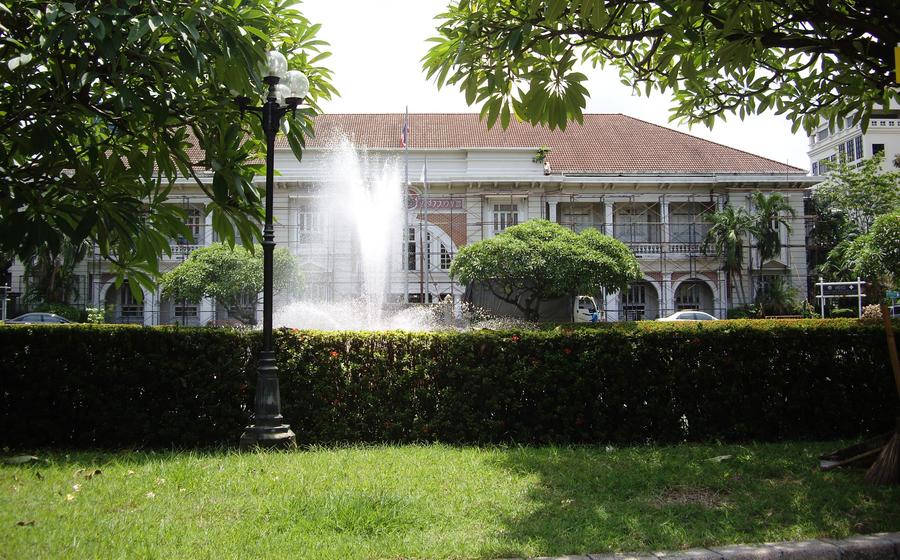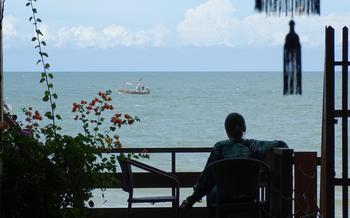
Snake Farm (Queen Saovabha Memorial Institute)
- A Historical Legacy of Venom Research and Antivenom Production
- Venomous Snake Exhibit
- Snakebite First Aid and Treatment
- Educational Programs and Outreach
- Snakebite Prevention Measures
- Research and Conservation Efforts
- Cultural Significance of Snakes in Thailand
- Souvenirs and Merchandise
- Accessibility and Facilities
- Visitor Etiquette and Safety Guidelines
A Historical Legacy of Venom Research and Antivenom Production
Thailand's rich history in snake venom research and antivenom production finds its roots in the establishment of the Queen Saovabha Memorial Institute, also known as the Snake Farm. Founded in 1913 as the first medical research facility in Thailand dedicated to the study of snake venom, the institute has played a pivotal role in advancing medical science and public health.
Inspired by the tragic loss of her sister from a snakebite, Her Royal Highness Princess Saovabha Phongsri, the daughter of King Chulalongkorn, championed the establishment of the Snake Farm. With the support of renowned bacteriologist and physician Dr. Léonard Rogers, the institute embarked on a mission to understand snake venom composition, develop effective antivenoms, and provide treatment for snakebite victims.
Over the years, the Snake Farm has expanded its scope of research, housing a diverse collection of venomous snakes from around the world. These snakes serve as a vital resource for venom extraction, enabling the production of life-saving antivenoms. The institute's contributions to snakebite prevention and treatment have significantly reduced snakebite-related fatalities in Thailand and beyond, making it a global leader in the field of venom research and antivenom production.
Venomous Snake Exhibit
In the vibrant heart of the Snake Farm, a captivating world of venomous snakes awaits visitors. Step into the realm of these mesmerizing creatures and discover the diverse collection of snakes from around the globe, each possessing unique characteristics and captivating behaviors.
Admire the sleek and deadly cobras, with their distinctive hoods and mesmerizing gaze. Witness the agility of vipers, masters of camouflage and stealth, as they glide effortlessly through their enclosures. Encounter the rattlesnakes, their iconic tails a warning rattle that echoes through the air.
Learn about the intricate adaptations that allow these snakes to thrive in various habitats, from tropical rainforests to arid deserts. Observe their specialized fangs, venom glands, and heat-sensing pits, which enable them to hunt and survive in their diverse environments.
The Venomous Snake Exhibit is not just a showcase of dangerous creatures; it's a testament to the incredible diversity and ecological significance of snakes. Gain a deeper appreciation for these often-misunderstood animals and their vital role in maintaining the balance of nature.
Snakebite First Aid and Treatment
Snakebites, though rare, can be life-threatening emergencies. Understanding the proper steps of first aid can significantly improve the chances of survival and reduce the risk of complications.
-
Immobilization: The primary goal of first aid is to immobilize the affected limb immediately. This prevents the venom from spreading through the lymphatic system and reduces the risk of complications.
-
Pressure Immobilization Bandage: Apply a pressure immobilization bandage over the bite site. Start by wrapping the bandage firmly around the wound, then continue wrapping up the entire limb, starting from the fingers or toes and working your way up. The bandage should be snug but not too tight to restrict blood flow.
-
Seek Immediate Medical Attention: Even if the bite appears minor, it is crucial to seek immediate medical attention. Antivenom is the only effective treatment for snakebites, and it must be administered as soon as possible to neutralize the venom and prevent life-threatening complications.
-
Accurate Snake Identification: Identifying the type of snake that caused the bite is essential for administering the correct antivenom. If possible, try to take a clear photo of the snake or remember its distinct markings to aid in identification.
Remember, snakebite first aid is only a temporary measure to slow the spread of venom and prevent further harm. Seeking immediate medical attention is paramount to ensure the best possible outcome.
Educational Programs and Outreach
In addition to its research and medical contributions, the Queen Saovabha Memorial Institute actively engages in educational programs and outreach initiatives to raise awareness about snakebite prevention, venom research, and conservation efforts. Guided tours, workshops, and presentations are conducted to educate visitors about the fascinating world of snakes, their ecological importance, and the institute's work in snake venom research and antivenom production. The institute also collaborates with schools, universities, and communities to provide educational resources and training programs on snakebite prevention and first aid. These educational initiatives aim to empower individuals with knowledge and skills to reduce the risk of snakebites and improve outcomes in case of a snakebite incident.
Snakebite Prevention Measures
In Thailand, snakebite prevention is crucial due to the diverse population of venomous snakes. While venturing into snake habitats, such as forests or fields, it's essential to wear protective clothing, including long pants, closed-toe shoes, and gloves. Be mindful of your surroundings and avoid placing your hands or feet in crevices or under rocks, where snakes may be hiding.
Educating rural communities about snakebite prevention is paramount, as snakebites are more prevalent in these areas. Raising awareness about snake habitats, safe practices when encountering snakes, and the importance of seeking immediate medical attention can significantly reduce snakebite-related fatalities.
If you encounter a snake in the wild, remain calm and avoid sudden movements. Slowly back away from the snake and give it ample space to retreat. Never attempt to handle or kill a snake, as this can provoke an attack. Instead, observe the snake from a safe distance and, if possible, take a photo for identification purposes.
By following these preventive measures and fostering a respectful coexistence with snakes, we can minimize the risk of snakebites and promote the conservation of these fascinating creatures.
Research and Conservation Efforts
In addition to its role in antivenom production, the Queen Saovabha Memorial Institute is actively engaged in research and conservation efforts related to snakes. The institute's research focuses on understanding snake venom composition, developing new and improved antivenom treatments, and studying snake ecology and behavior. This research is crucial for improving our understanding of snakes and their impact on human health and the environment.
The institute is also committed to snake conservation, recognizing the importance of protecting these animals and their habitats. The institute's conservation efforts include habitat protection, captive breeding programs, and reintroduction projects. The institute works closely with other organizations and government agencies to ensure the long-term survival of snake populations in Thailand and beyond.
Through its research and conservation initiatives, the Queen Saovabha Memorial Institute plays a vital role in advancing our knowledge of snakes, developing life-saving antivenom treatments, and protecting these fascinating creatures for future generations.
Cultural Significance of Snakes in Thailand
Snakes hold a profound cultural significance in Thailand, deeply intertwined with the nation's mythology, folklore, and traditional beliefs. In Thai mythology, snakes are often depicted as powerful and revered creatures, associated with fertility, protection, and wisdom. The revered Naga, a mythical serpent-like creature, is a prominent figure in Thai art, literature, and religious ceremonies.
In Thai folklore, snakes are often portrayed as guardians of temples and sacred sites, believed to possess supernatural powers. Many Thai people believe that snakes bring good luck and fortune, and some even keep snakes as pets or offer them food and shelter in their homes.
The coexistence of snakes and humans in Thailand is a testament to the deep respect and understanding that Thai people have for these fascinating creatures. Snake charming, a traditional form of entertainment, showcases the skill and expertise of snake handlers who work closely with venomous snakes.
Exploring the cultural significance of snakes in Thailand offers a unique glimpse into the country's rich heritage and beliefs. Visitors to the Snake Farm can gain a deeper appreciation for the complex relationship between snakes and Thai society, fostering a greater understanding of the cultural significance of these remarkable creatures.
Souvenirs and Merchandise
The Snake Farm offers a unique opportunity to purchase souvenirs and merchandise that not only commemorate your visit but also support the institute's ongoing research, conservation, and educational programs. From snake-themed clothing and accessories to books and educational materials, there is something for everyone.
The gift shop is stocked with a wide variety of items, including T-shirts, hats, scarves, and jewelry adorned with snake motifs. Visitors can also find books on snake venom, snake ecology, and the history of the Snake Farm. For those interested in learning more about snakes, there are educational materials such as DVDs, posters, and children's books.
By purchasing souvenirs from the Snake Farm, visitors contribute directly to the institute's mission to study and conserve snakes. Proceeds from sales help fund research projects, support conservation initiatives, and develop educational programs that benefit both local communities and the global scientific community.
When choosing souvenirs, opt for sustainable and eco-friendly options that align with the Snake Farm's commitment to conservation. Look for items made from recycled materials or featuring designs that promote snake awareness and protection.
Among the unique items available at the Snake Farm is a collection of snake venom jewelry. These one-of-a-kind pieces are crafted using real snake venom, safely extracted and preserved in a clear resin. Each piece is a stunning conversation starter and a reminder of the fascinating world of snakes.
Whether you're a snake enthusiast, a science buff, or simply looking for a meaningful souvenir from your visit to Bangkok, the Snake Farm gift shop has something for everyone. By making a purchase, you not only take home a piece of the Snake Farm experience but also contribute to the important work of snake conservation and research.
Accessibility and Facilities
The Snake Farm is committed to providing an accessible and inclusive environment for all visitors. Wheelchair ramps and elevators ensure that guests with disabilities can easily navigate the institute's facilities. Accessible restrooms are also available for convenience.
For families with young children, the Snake Farm offers a variety of amenities to make their visit more enjoyable. Stroller parking is available, and there are designated areas where children can rest and play. The institute also provides educational programs and activities designed specifically for children, allowing them to learn about snakes and snake venom in a fun and engaging way.
For individuals with phobias or allergies, the Snake Farm staff is trained to provide assistance and support. Visitors with specific needs are encouraged to contact the institute in advance to discuss any concerns or requirements. The staff will be happy to work with you to ensure a safe and enjoyable visit.
The Snake Farm also features a cafeteria where visitors can purchase snacks and drinks. A gift shop is also available, where you can find a variety of snake-themed souvenirs and educational materials. Proceeds from the gift shop contribute to the institute's research, conservation, and educational programs.
Visitor Etiquette and Safety Guidelines
When visiting the Snake Farm, it is crucial to adhere to visitor etiquette and safety guidelines to ensure a safe and enjoyable experience for all. Visitors should maintain a respectful distance from the snakes and avoid disturbing or provoking them. Sudden movements and loud noises should be avoided, as these can startle the snakes and increase the risk of a bite. It is essential to follow the instructions of the tour guides and staff members, who are trained to handle the snakes safely and can provide guidance on how to interact with them responsibly. By following these guidelines, visitors can help protect themselves, the snakes, and other guests, and contribute to a positive and educational experience for everyone.






